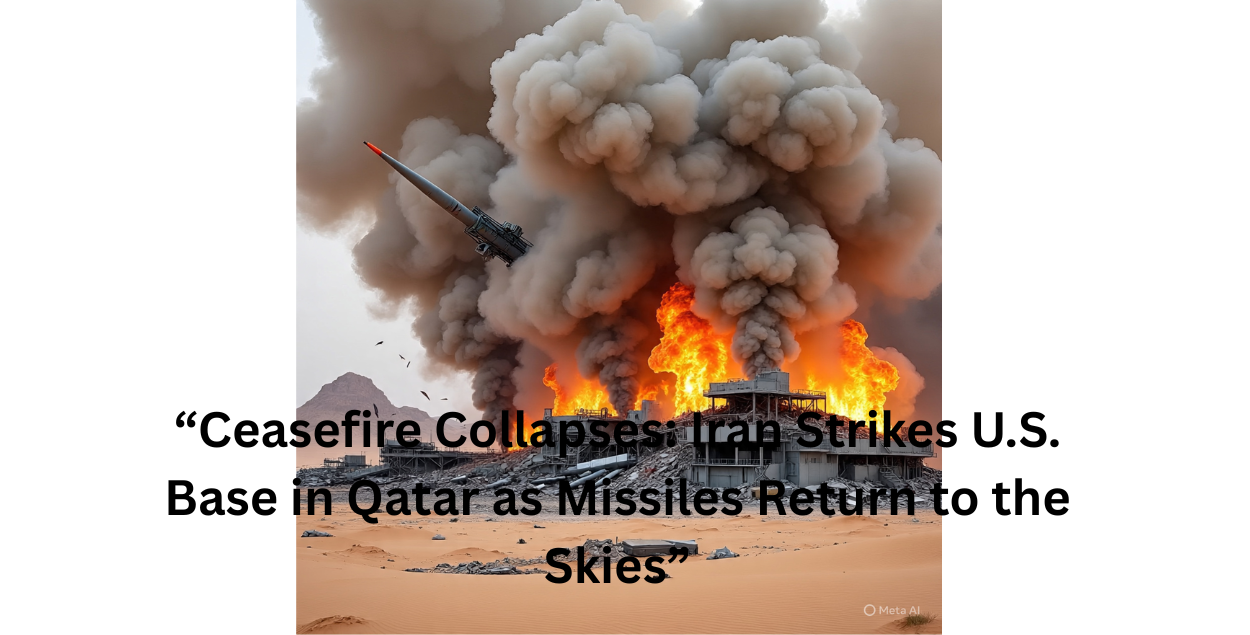FnF News
🇺🇸 FNF News | Middle East Conflict | National Security
Published: June 25, 2025
By: Khadija Khan, Senior Defense Correspondent
Ceasefire in Name Only: Iran Targets U.S. Base in Qatar as Israel-Iran Tensions Explode Again
DOHA — Any illusion of a stable ceasefire between Iran and Israel collapsed this week as Iran fired a new volley of missiles at the U.S. Al‑Udeid Air Base in Qatar, triggering rapid defense countermeasures, international panic, and a wave of airspace shutdowns across the Gulf.
Qatar’s American-built air defenses — including Patriot, NASAMS, and Rapier systems — successfully intercepted all six incoming ballistic missiles. But the message from Tehran was unmistakable: This isn’t over.
Iran’s Strike, Qatar’s Response
The Islamic Republic’s military, via its elite Revolutionary Guard Corps (IRGC), claimed credit for the strike in a statement carried by state-run media. The attack, labeled Operation Glad Tidings of Victory, was said to be a “measured response” to Operation Midnight Hammer, a recent U.S. air campaign that crippled Iran’s buried nuclear sites at Fordow, Natanz, and Isfahan.
Qatari officials condemned the strike but confirmed Iran warned them in advance, giving their forces just enough time to prepare and intercept. The base — housing over 10,000 U.S. personnel — sustained no damage or casualties.
Ceasefire Breaking Down
Despite President Trump’s announcement of a “phased ceasefire” between Iran and Israel earlier this week, fresh strikes by both nations have raised doubts over whether any agreement still holds. Israeli airstrikes reportedly resumed Tuesday night, targeting Damascus and southern Lebanon — with Iran-linked militias returning fire.
Iran’s Supreme Leader Ali Khamenei, in a rare live address, accused the U.S. of “double-dealing” and warned that “no American base will be beyond our reach if this aggression continues.”
Gulf on High Alert
Following the Qatar strike:
- UAE, Bahrain, and Kuwait closed their airspace.
- Flights across the region were delayed or rerouted.
- Saudi Arabia activated its own Patriot batteries and radar networks.
Meanwhile, U.S. Cyber Command confirmed elevated cyber threats against American oil, military, and telecom assets — linked to Iranian hacker groups.
USS Gerald R. Ford Moves In
The USS Gerald R. Ford carrier strike group, the most advanced in the U.S. Navy, is now en route to the eastern Mediterranean. Pentagon officials told FNF News that it is prepared to enforce maritime security near the Strait of Hormuz and provide “immediate retaliatory capability” if provoked.
Diplomacy Failing, Pressure Rising
Though European and Gulf diplomats continue to push for renewed talks in Vienna, few believe meaningful diplomacy is possible while missiles are still flying. The United Nations has failed to convene a Security Council emergency session.
At home, Trump’s political base has rallied behind the strikes, while Democrats demand greater congressional oversight and international coordination. Independent analysts warn that the window to prevent full-scale regional war is rapidly closing.
Proxy Forces Ready
- Hezbollah in Lebanon is reportedly repositioning rocket units.
- Kata’ib Hezbollah militias in Iraq have begun mobilizing convoys.
- Houthis in Yemen claimed responsibility for drone activity near Israeli waters.

